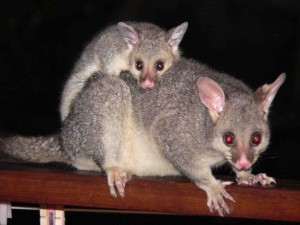As Australians begin the workweek with a hung parliament after yet another federal election, I aptly turn my attention to the politicians of the rodent world: possums.
 The Australian climate can be harsh, in a No-Country-for-Old-Men sorta way, with temperature extremes, flooding, followed by five years of drought.
The Australian climate can be harsh, in a No-Country-for-Old-Men sorta way, with temperature extremes, flooding, followed by five years of drought.
So we have new-fangled rain barrels that my grandparents used to have in Ontario (ours, right, exactly as shown and I know there’s possums wandering around there at night because possum poop accumulates).
The rainwater is supposed to be used for toilets, dishes, laundry and other non-potable uses, but is there a risk (no drinking from the garden hose here)?
Here’s the most recent from researchers:
Avian and possum fecal droppings may negatively impact roof-harvested rainwater (RHRW) water quality due to the presence of zoonotic pathogens. This study was aimed at evaluating the performance characteristics of a possum feces-associated (PSM) marker by screening 210 fecal and wastewater samples from possums (n = 20) and a range of nonpossum hosts (n = 190) in Southeast Queensland, Australia.
The host sensitivity and specificity of the PSM marker were 0.90 and 0.95 (maximum value, 1.00), respectively. The mean concentrations of the GFD marker in possum fecal DNA samples (8.8 × 107 gene copies per g of feces) were two orders of magnitude higher than those in the nonpossum fecal DNA samples (5.0 × 105 gene copies per g of feces). The host sensitivity, specificity, and concentrations of the avian feces-associated GFD marker were reported in our recent study (W. Ahmed, V. J. Harwood, K. Nguyen, S. Young, K. Hamilton, and S. Toze, Water Res 88:613–622, 2016, http://dx.doi.org/10.1016/j.watres.2015.10.050). The utility of the GFD and PSM markers was evaluated by testing a large number of tank water samples (n = 134) from the Brisbane and Currumbin areas. GFD and PSM markers were detected in 39 of 134 (29%) and 11 of 134 (8%) tank water samples, respectively. The GFD marker concentrations in PCR-positive samples ranged from 3.7 × 102 to 8.5 × 105 gene copies per liter, whereas the concentrations of the PSM marker ranged from 2.0 × 103 to 6.8 × 103 gene copies per liter of water. The results of this study suggest the presence of fecal contamination in tank water samples from avian and possum hosts.
 This study has established an association between the degradation of microbial tank water quality and avian and possum feces. Based on the results, we recommend disinfection of tank water, especially for tanks designated for potable use.
This study has established an association between the degradation of microbial tank water quality and avian and possum feces. Based on the results, we recommend disinfection of tank water, especially for tanks designated for potable use.
Importance
The use of roof-harvested rainwater (RHRW) for domestic purposes is a globally accepted practice. The presence of pathogens in rainwater tanks has been reported by several studies, supporting the necessity for the management of potential health risks. The sources of fecal pollution in rainwater tanks are unknown. However, the application of microbial source tracking (MST) markers has the potential to identify the sources of fecal contamination in a rainwater tank. In this study, we provide evidence of avian and possum fecal contamination in tank water samples using molecular markers. This study established a potential link between the degradation of the microbial quality of tank water and avian and possum feces.
Evidence of avian and possum fecal contamination in rainwater tanks as determined by microbial source tracking approaches
Ahmed a, K. A. Hamilton a,b, P. Gyawali a,c, S. Toze a,c and C. N. Haas b
A CSIRO Land and Water, Ecosciences Precinct, Brisbane, Queensland, Australia
B Drexel University, Philadelphia, Pennsylvania, USA
C School of Public Health, University of Queensland, Herston, Queensland, Australia
Applied and Environmental Microbiology, Volume 82, Number 14, Pages 4379-4386, doi:10.1128/AEM.00892-16
http://aem.asm.org/content/82/14/4379.abstract?etoc
 Last night we had barramundi fillets, grilled in a garlic-butter-olive oil-lemon-and-basil coating that was delicious.
Last night we had barramundi fillets, grilled in a garlic-butter-olive oil-lemon-and-basil coating that was delicious.

